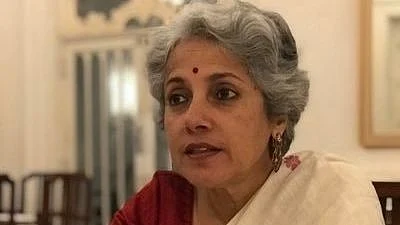World Health Organization (WHO) Chief Scientist Soumya Swaminathan has stated that India seems to have reached some sort of stage of endemicity in terms of the COVID-19 prevalence.
In an interview with The Wire, which was published on Tuesday, 24 August, Dr Swaminathan said that COVID-19 is likely to assume the form of an endemic, instead of its present status as an epidemic, by the end of 2022. In the endemic stage, the population can learn to live with the virus.
This transformation will be facilitated by ensuring vaccination as well as COVID-19 appropriate behaviour, she indicated.
'Nationwide Third Wave Unlikely': WHO Chief Scientist Swaminathan
Dr Swaminathan stated in the interview that it was possible that the present COVID-19 situation in the country may continue to prevail in the coming time. A few local ups and downs may occur, but they are unlikely to be as severe or as widespread as the second wave.
Speaking about the possibility of a third wave, the public health expert told The Wire that one cannot make predictions about when it will hit or how bad it will be.
She further stated that while it was possible that a large number of children could be infected in the third wave, it was highly unlikely that they would develop a serious disease.
The chief scientist also shared Bharat Biotech's Covaxin was likely to receive WHO authorisation by mid-September.
Indian drugmaker Bharat Biotech on 12 June had said that the pharmaceutical company expects to receive emergency use listing (EUL) for its COVID-19 vaccine, Covaxin, from the WHO, very soon.
"The review process has now commenced with the expectation that we will receive EUL from WHO at the earliest," Bharat Biotech had stated in an official release.
'Preparing for COVID-19 Third Wave Is the Need of the Hour': NIDM
"(T)he need of the hour is to prepare for the third wave if and when it hits the nation," a report on 'Third Wave Preparedness' by the National Institute of Disaster Management (NIDM), which comes under the Home Ministry, has stated.
The report, which examines various facets of the third wave preparedness in India, quoted a research conducted by the Indian Institute of Technology (IIT), Kanpur, that found that a third outbreak may hit the country some time between September and October.
The report by the NIDM has listed two indicators that indicate the onset of a third COVID-19 wave in India.
There has been a slowdown in the downward trend of daily COVID-19 infections and a slight increase in the positivity rate.
The R-value, which is the reproduction rate of COVID-19, increased from 0.96 to 1 in the last few days of July and has been flagged as a matter of concern by the All India Institute of Medical Sciences.
(With inputs from The Wire)
(At The Quint, we question everything. Play an active role in shaping our journalism by becoming a member today.)
